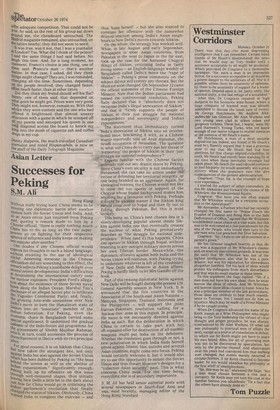Asian Letter
Successes for Peking
S.1VI Ali
Hong Kong Without really trying hard, China seems to be winning one diplomatic battle after another against both the Soviet Union and India. And, as an Asian envoy just returned from Peking quoting a remark made to him by a `-hiriese official, "there is really nothing much China has to do, as long as the two super, Powers go on fighting for their respective sPheres of influence and India keeps on making one mistake after another,"
One doubts if any Chinese official would express his thoughts in such a bland language, without resorting to the use of ideological cliche'. Assuming someone in the Chinese Officialdom did say something to this effect, the remark reflects Peking's justifiable delight over 8. everal recent developments: India's difficulties ,111 neutralising the international outcry over 'ler nuclear explosion; President Ford's allegal'ou about the existence of three Soviet naval °_,ases along the Indian Ocean; Marshal Tito's uisclosure of an alleged Soviet plot to infiltrate ttle Yugoslav Communist Party; and, finally, le growing Asia-wide uneasiness over New ,1-1elhi's move to turn the Himalayan state of into an "associate" member of the Lndian federation. For Peking, even the °Ilomic chaos in Bangladesh carried some 'Pedal significance. It underlined the gradual ,TliaPse of the Indo-Soviet aid programme for e government of Sheikh Mujibur Rahman, ,Woich, in turn, could accelerate the process of `usenchantment in Dacca with its two principal allies.
3, For good reasons, it is on Sikkim that China "as now taken the strongest line, not only 4ga1nst India but also against the Soviet Union has been dubbed by Peking as "the boss rhind the scenes as well as the abettor of illd„!ah expansionism." Significantly enough, built up its offensive on this issue le r°,ugh well-measured stages, thus initially
New Delhi a little bit in the dark about
how far China would go in criticising the crilluian parliament's resolution that finally „. auged the status of Sikkim. Obviously, China wanted India to complete the exercise — and
thus 'hang herself' — but she also Wanted to correlate her offensive with the somewhat delayed reaction among India's Asian neighbours to New Delhi's moves towards Sikkim.
On the whole, the strategy has worked well. While, in late August and early September, newspapers in most Asian countries, from Pakistan in the west to Japan in the far east, took up the case for the harassed Chogyal (king) of Sikkim, criticising India in fairly strong terms — an English-language weekly of Bangladesh called Delhi's move the "rape of Sikkim" -Peking's press comments on the subject did not still convey any threats. But the situation soon changed. On September 12 came the official statement of the Chinese Foreign Ministry. Now that the Indian parliament had passed the controversial resolution, Peking flatly declared that it "absolutely does not recognise India's illegal annexation of Sikkim" and that it "firmly supports the people of Sikkim in their just struggle for national independence and sovereignty and Indian expansionism." The statement thus immediately turned India's annexation of Sikkim into an interna tional issue, bracketing it with, as a Chinese source reportedly told an Arab diplomat, the Israeli occupation of Jerusalem. The question is, what will China do to carry out her threat of 'supporting' the people of Sikkim in their 'just struggle for national independence'? Experts familiar with the Chinese tactics generally rule out any drastic move by Peking. Since China's own security is not immediately threatened, she can take no action under the excuse of defending her territorial integrity, or risk being branded as an aggressor. Again, for ideological reasons, the Chinese would not like to come out too openly in support of the Chogyal whose feudal background makes him anything but a favourite with Peking. Perhaps it might be another matter if the Sikkim king' should cross over to Nepal and then fly out to Peking, through Pakistan. But this is most unlikely. This being so, China's best chance lies in a slowly-developing popular unrest inside Sik kim against India, one that eventually creates the nucleus of what Peking prematurely describes as "the struggle for national inde pendence." When (and if) this happens, China can operate in Sikkim through Nepal, without resorting to any outright military moves across her own Tibetan border. Meanwhile, the diplomatic offensive against both India and the Soviet Union will continue, with Peking trying to undermine whatever is left of the credibility of New Delhi and Moscow in Asian affairs. Peking is hardly likely to let Mrs Gandhi off the hook. Part of this ensuing diplomatic battle against New Delhi will be fought during the:present UN General Assembly session in New York. It is announced that the five countries in the Association of the South-east Asian Nations — Malaysia, Singapore, Thailand, Indonesia and the Philippines — will support the joint Iranian-Pakistani resolution calling for a 'nuclear-free' zone in this region. In principle, the move is not necessarily directed against India as such. But the deliberation in which China is certain to take part with her oft-repeated offer for destruction of all nuclear weapons, might put India on the defensive. Whether the resolution goes through or not, a new polarisation in which India finds herself pitted against Islamic bloc nations and several
Asian countries, might come into focus. Peking would certainly welcome it, but it would also
try to use this opportunity to isolate the Soviet Union and thus thwart Moscow's designs for a "collective Asian security" pact. This is what concerns China most. For the time being, everything else is of secondary importance.
S. M. Ali has held senior editorial posts with several newspapers in South-East Asia and Was, most recently, managing editor of the Hong Kong Standard










































 Previous page
Previous page